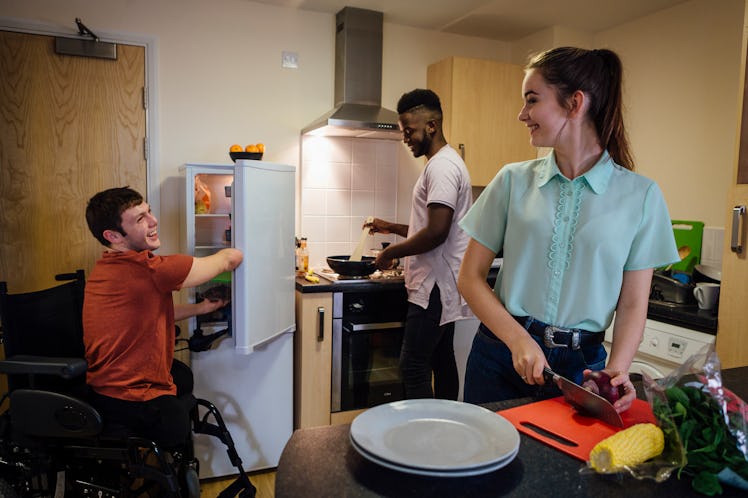
Here's What You & Your Roommates Should Be Discussing For Coronavirus Prep
On Wednesday, March 11, the World Health Organization (WHO) officially classified the outbreak of coronavirus as a pandemic. According to The New York Times, there are already more than 1,600 confirmed coronavirus cases in the United States alone as of March 13. As the coronavirus continues to spread, you might be wondering how to prepare for coronavirus if you have roommates. If you or someone you live with becomes infected with coronavirus, the Centers for Disease Control and Prevention (CDC) has issued guidelines for what to do.
The bottom line of the CDC's guidelines is simple: If someone in your home is infected with coronavirus, limit your contact with them as much as possible. Of course, this is easier said than done, so it's best to come up with a detailed plan for your household before any of your roommates are exposed to the virus. If someone you live with contracts coronavirus, they should try to stay in a specific room as much as possible, away from everyone else who shares the residence. And if there are ever moments when they need to be in the same room as other people, they should wear a face mask unless they have trouble breathing while wearing one, per the CDC.
If possible, coronavirus patients in your household should also be using a separate bathroom — but that isn't always possible, especially if you're sharing a cramped three-bed, one-bath apartment with roommates. In that case, the CDC recommends cleaning all "high-touch" surfaces with a household disinfectant every day. High-touch surfaces include bathroom surfaces, kitchen counters, phones, tabletops, and other things everyone in the house regularly touches.
As much as possible, the CDC also recommends roommates avoid sharing plates, cups, towels, bedding, or other frequently used household items with anyone who is infected with coronavirus. If one or more of your roommates catches the virus, you should make sure that they're the only ones using certain plates or towels, and thoroughly wash them after each use with soap and water. Dr. Rachael Piltch-Loeb, a preparedness fellow at Harvard's T.H. Chan School of Public Health, tells Elite Daily if you live with one or more people, "the likelihood they also will be infected by a contagious virus is high." That's why Piltch-Loeb advises roommates to follow CDC recommendations by practicing personal hygiene, regularly cleaning high-touch surfaces, wearing a face mask if you think you have coronavirus, and avoiding any shared household items.
Beyond these recommendations, the CDC's guidance for roommate households is similar to its guidelines for everyone else, namely that everyone should continue practicing basic hygiene. The CDC reminds everyone to cover your nose and mouth with a tissue when you cough and sneeze, and to wash your hands with soap and water for at least 20 seconds before eating, after using the bathroom, and if you've made contact with high-touch surfaces in public spaces. You should also stay at home while you're sick, and only go to the doctor if you call ahead and they recommend you come in. If you and your roommates have pets and one or more of you gets sick, you should also make sure to come up with a contingency plan so only healthy people are caring for your pets.
Now that the WHO has classified coronavirus as a pandemic, it can be tempting to panic, but it really isn't necessary as long as you take some basic precautions. You might be worrying about living in such close proximity to your roommates as the virus spreads, but if you and your roommates maintain a hygienic living space and self-isolate to the best of your availability when one of you is sick, you will have taken some key preventative measures to keep yourselves healthy.
If you think you’re showing symptoms of coronavirus, which include fever, shortness of breath, and cough, call your doctor before going to get tested. If you’re anxious about the virus’s spread in your community, visit the CDC for up-to-date information and resources, or seek out mental health support. You can find all Elite Daily's coverage of coronavirus here.
Experts cited:
Dr. Rachael Piltch-Loeb, preparedness fellow at Harvard University's T.H. Chan School of Public Health